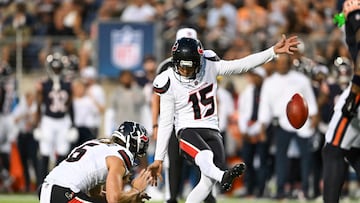While some see it as superficial in nature, the NFL’s new rule change has sparked a variety of reactions from fans. Needless to say, not everybody is on board.
Paul RudderEnglish_ASUpdate: Aug 2nd, 2024 12:47 EDT0

NICK CAMMETTAFP
Alongside a move to clamp down on a controversial pre-snap movement, the NFL has now taken the step to implement a new form of kickoff. Whether these are the squeaky wheels in need of fixing remains to be seen, but the league certainly believes they can reduce what some see as a “cheat” motion and increase player safety respectively.
NFL’s “dynamic kickoff” introduced in Bears vs Texans Hall of Fame Game
As football fans would have seen, The NFL returned on Thursday with the Hall of Fame Game between the Chicago Bears and Houston Texans in Canton, Ohio. Now, while it was obviously a joy to have football on show once again, the true head-turner of the day was the opening kick-off as the league debuted the newly implemented “dynamic kickoff.”
For the first time… the Dynamic Kickoff 🙌📺: @ProFootballHOF Game on ESPN/ABC📱: Stream on #NFLPlus pic.twitter.com/wga0LmuvtH
— NFL (@NFL) August 2, 2024
For the purpose of context, it should be noted that the NFL adjusted its rules for kickoffs ahead of the 2024 season in an effort to promote player safety by reducing the high volume of injuries that occur on special teams plays. In terms of what has changed, it’s first important to know what hasn’t i.e., where the kickoff takes place. As has always been the way, the kickoff team will continue to tee up the ball at their own 35-yard-line. Once the ball is kicked, however, fans will immediately notice that there are some significant differences.
To begin with, the kickoff team is no longer permitted to start running as soon as the ball is kicked. From now on, they can only begin their run once the ball has been caught by the returner or it hits the ground. Understandably, this grants the returning team much more time to map out a formation as it attempts to bring the ball up the field. to begin to run as soon as the ball is kicked. Instead, they can only begin running down the field once the ball is caught by a returner or hits the ground. This will give the return team significantly more time to get a head of steam and organize their return formations.

